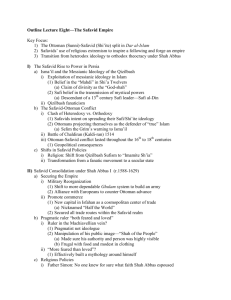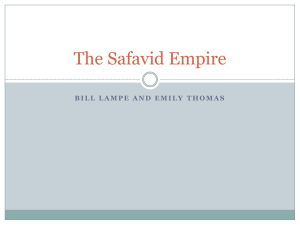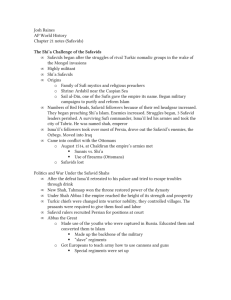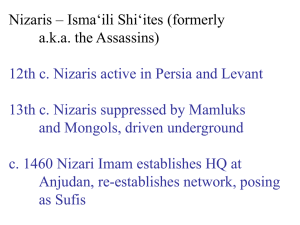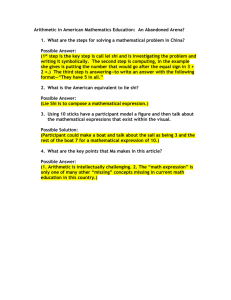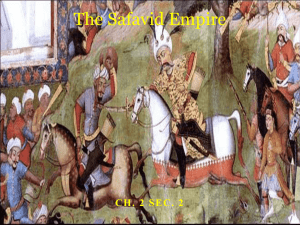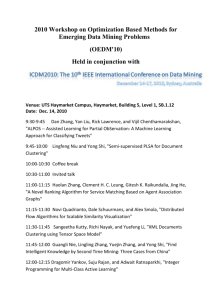Safavids
advertisement
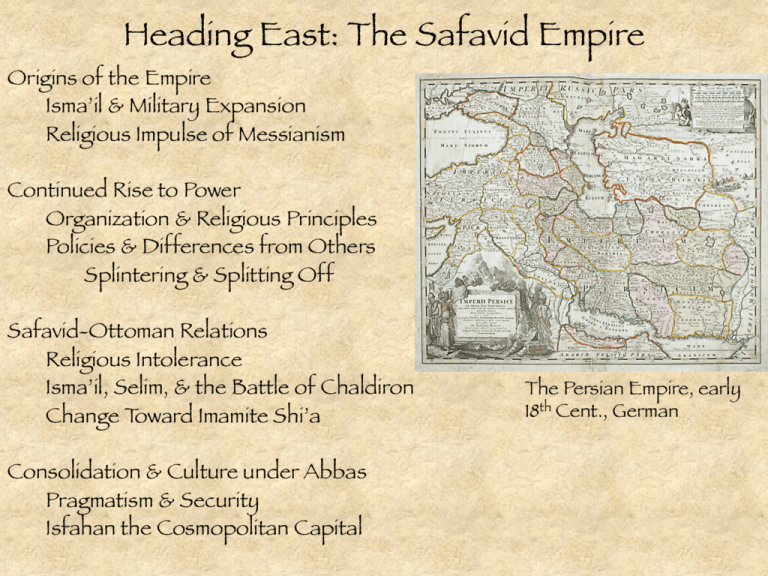
Heading East: The Safavid Empire Origins of the Empire Isma’il & Military Expansion Religious Impulse of Messianism Continued Rise to Power Organization & Religious Principles Policies & Differences from Others Splintering & Splitting Off Safavid-Ottoman Relations Religious Intolerance Isma’il, Selim, & the Battle of Chaldiron Change Toward Imamite Shi’a Consolidation & Culture under Abbas Pragmatism & Security Isfahan the Cosmopolitan Capital The Persian Empire, early 18th Cent., German Origins of the Empire Isma’il & Military Expansion Rise to Power 1501/2 as Safavid Shah; Tabriz Military Aid: Qizilbash (Turkish Warriors) Strong Supporters of Shi’ism Persecuted Group under Ottomans Consolidating Smaller Territories Linguistic, Cultural Variation Pushing East (Uzbeks, Central Asia) Pushing West (Ottomans, Baghdad) Religious Impulse of Messianism Safavids a Sufi Order from 14th C. Military & Religious Brotherhood Deep Roots in Sufi Aspect of Islam Mystical, Ascetic Shi’ism as Heterdox or Orthodox Sect Matter of Perspective Shah Isma’il Sufism: “dedication to worship, total dedication to Allah most High, disregard for the finery and ornament of the world, abstinence from the pleasure, wealth, and prestige sought by most men, and retiring from others to worship alone.” Ibn Khaldun, Arab Historian, 14th C. Continued Rise to Power Organization & Religious Principles Shi’ism Official State Religion Sunni Conversion Mandatory Theocracy: Shah Divinely Ordained Strong Central State & Church Controlling Turkish Qizilbash & Native Persian Elements Potential for Disunity Policies & Differences from Others Splintering & Splitting Off Shi’ites Followers of Ali (Son-in-Law) Hidden Imam – 12th Descendant Safavid Dynasty & Religious Uniformity Emphases on Religious Texts, Rites Banned Pilgrimage to Mecca (Hajj) Strong Shi’ite Identity in Education, Philosophy, Culture, & Politics Pilgrims at The Sacred/Holy Mosque, Celebrating their Hajj Safavid-Ottoman Relations Religious Intolerance (cf. Xty) Ottomans vs. Qizilbash Shi’a Safavids vs. Sunni & Others Forced Conversions; Banishment Educational/Cultural Indoctrination Isma’il, Selim, & the Battle of Chaldiran Territorial Expansion (Both) Saw Each Other as Threat Selim’s Key Victory at Chaldiran, 1514 Captured Tabriz (Temporarily) Use of Modern Artillery Change Toward Imamite Shi’a Less Focus on Militant Qizilbash Isma’il Withdraws from Administration Shah’s Divinity Questioned Battle of Chaldiran, Where Isma’il’s Fate Turned Safavid-Ottoman Rivalry in Letters Selim to Isma’il, 1514, before Chaldiran . . . “I, sovereign chief of the Ottomans, master of the heroes of the age . . . exterminator of idolators, destroyer of the enemies of the true faith . . . address myself graciously to you, Emir Ismail. . . . You have denied the sanctity of the divine laws . . . have deserted the path of salvation and sacred commandments . . . have impaired the purity of the dogmas of Islam . . . have dishonored, soiled, and destroyed the altars of the Lord[.] . . . Animated by the spirit of this fatwa [religious ruling], conforming to the Quran, the code of divine laws, and wishing on the one side to strengthen Islam, on the other to liberate the lands and peoples who writhe under your yoke, we have resolved to lay aside our imperial robes in order to put on the shield and coat of mail [armor] . . . to assemble our invincible armies . . . to march with our soldiers, whose sword strikes mortal blows[.] . . . [W]e hope soon to strike down your tyrannous arm, blow away the clouds of glory and grandeur which trouble your head and cause your fatal blindness[.] . . . However, . . . [w]e urge you to look into yourself, to renounce your errors, and . . . give up possession of the territory violently seized from our state[.] . . . But if . . . you persist in your past conduct . . . you will see in a few days your plains covered with our tents and inundated with our battalions.” Consolidation & Culture under Abbas (r. 1587-1629) Pragmatism & Security Less Aggressive Military Policy But Still Had to Fight Off Ottomans Treaties of 1555 & 1590 Turn to Secular > Theocratic Administration Abbas (the Great) Reasserts Imperial Role Wars vs. East & West to Secure Boarders Putting Down Qizilbash Rebellions Utilizing Position Along Trade Route English East India Company Using Land Isfahan the Cosmopolitan Capital Tabriz – Qazwin – Isfahan; Central Location A Major Global City of the 17th Cent. Seat of Persian Culture & Nationalism Parks, Libraries, Buildings, Palaces “Isfahan is Half the World” Uzbek Warrior, Perennial Threat to the East Persians Playing Polo, mid-16th Cent., as They Did on the Square Isfahan’s Central Square, with the Ali Qapu Palace at Right
